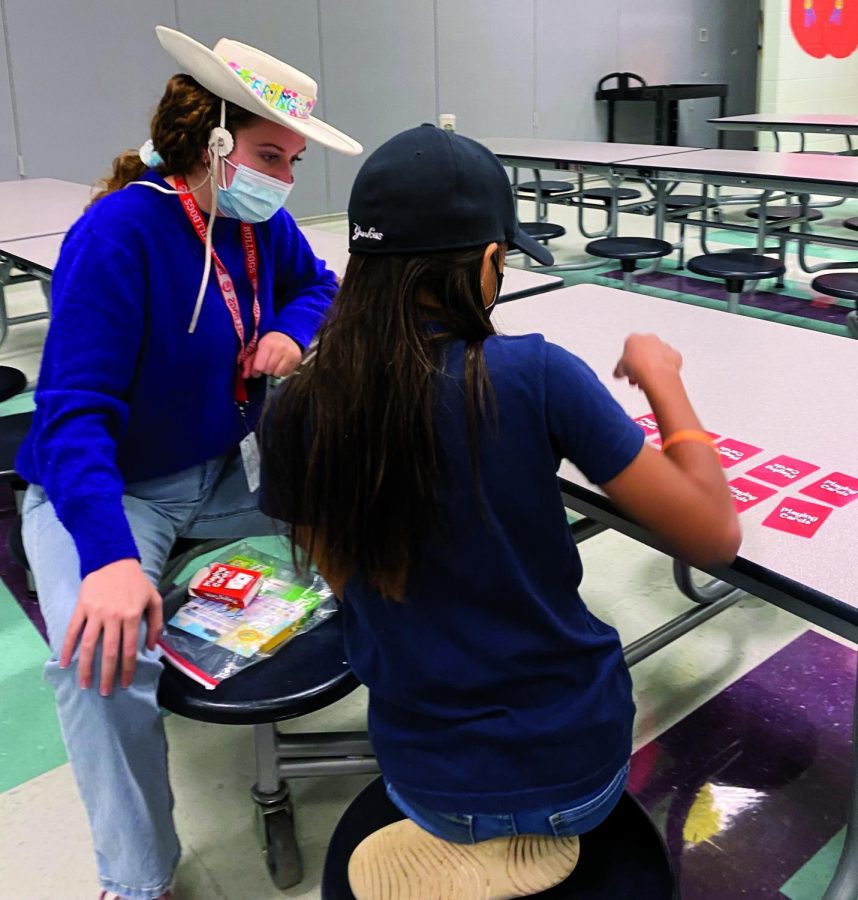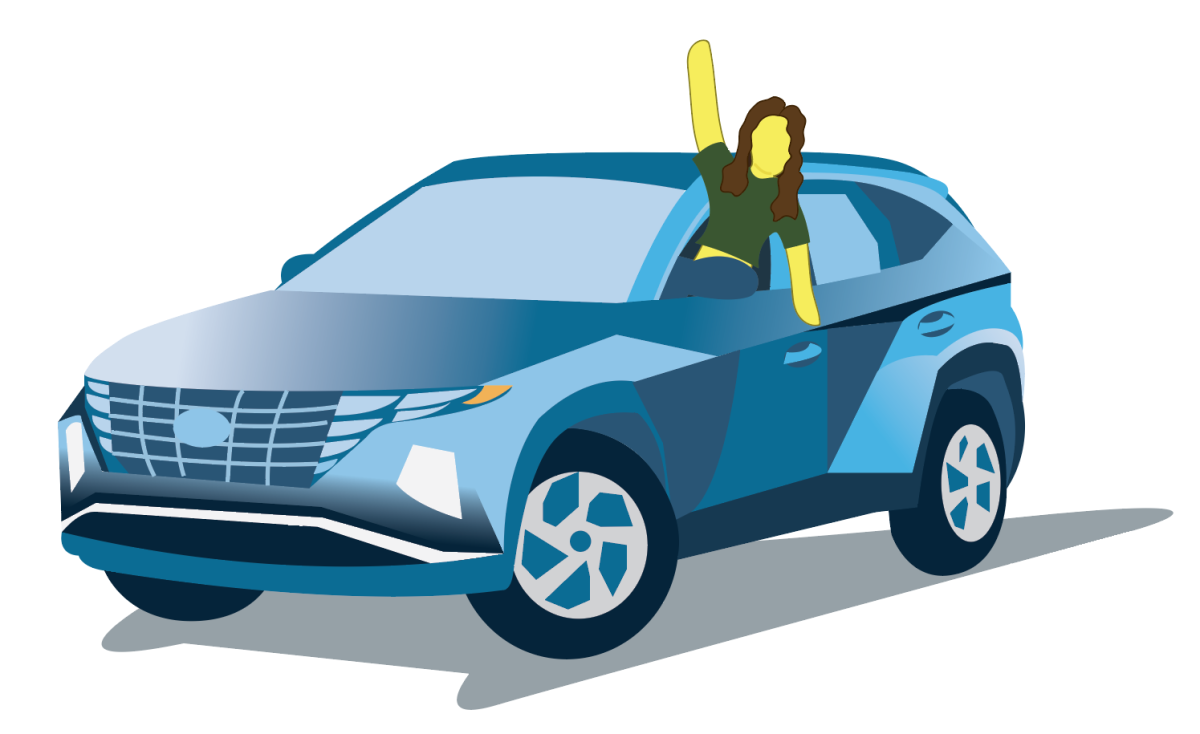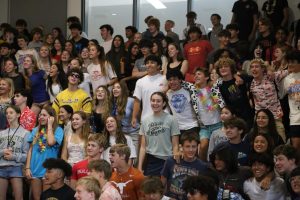Guardian angels guiding young minds
ENGAGING IN GAMES: Senior Kelli Robinson plays card games with her Mills Elementary PALee. The PAL students go every Tuesday and Thursday to local elementary schools.
November 22, 2021
Restoring community outreach with PALs & Ready Set Teach after inability to visit feeder schools
Guiding the youth to excel, Bowie students part of Peer Assistance Leadership and Service (PALS) and Ready, Set, Teach (RST) spend their time going to different elementary schools to assist the teachers in helping grow these young minds. However, with COVID taking over the world last year PALS and RST had to find other ways to help with their programs.
PALS is a nationwide program with the directive to provide counseling to young minds. PALS work with students from feeder schools, called PALees, through direct mentoring.
“Letting high school kids have a way to reach out to the community to provide good influences and a positive attitude in someone’s life, it’s so meaningful and impactful to so many people,” PALS teacher Alejandro Garcia said. “[Elementary school] is such an impressionable age, sometimes they really do need encouragement as well as support.”
While PALS consists of personal mentoring, RST uses a more general approach. The program assigns a student to a specific classroom to be an assistant teacher. At the beginning of the year students mainly spend their time only assisting the teacher with some assistance among small groups, and also assist individuals understand anything they are struggling with. However, students will begin facilitating lessons after the winter break.
“Ready Set Teach is offered for students who think they might want to explore a career in education or for students who want to explore a career working with children,” RST Instructor Kelly Langdon said. “So it’s an opportunity to get our Bowie students off campus, in an internship setting. It gives them job experience and exposure to the field of education.”
These classes provide high school students with the opportunity to explore careers in education or working with children through experience.
“I’m not sure if I want to be a teacher but I know for sure that I want to work with kids, so I think it’s good to have that experience before I decide to major in something in college,” junior Olivia Walker said.
PALS and RST don’t only provide the ability to explore careers, but also allow students to outreach to their community and assist those in need.
“I impact the students by being a positive light in their lives,” senior Brodi Tokar said. “We stress the importance of being a friend and supporting them through whatever difficulties they have in their lives and classes.”
Tokar emphasizes the fulfillment being apart of PALS brings him and expresses why he decided to join PALS initially.
“I care about helping kids that go through similar problems I went through as a kid. Being a positive light in their life, while helping them become the best, happiest version of themselves means the world to me,” Tokar said. “I know how much a PAL would have helped me at their age, so I feel honored to be in the place where I am a PAL.”
During the peak of COVID, PALS was unable to return to elementary schools and was forced to find other means to pursue the class’s goals. Rather than PALS reaching out to other communities, they instead decided to work on improving the Bowie community. They worked on team-building exercises, improving the campus, and assisted Bowie students via Zoom.
“Even with COVID still ever so present in our daily lives, in PALS, we are lucky enough to go to elementary schools and help the kids just like we were supposed to in the beginning,” Tokar said. “I am so grateful we are back and helping kids in person.”
While PALS completely differed from their norm over COVID, RST found different ways for Bowie students to impact and interact with the young students. Initially they had Bowie students join Zoom calls with the elementary schools and occasionally joining breakout rooms to help assist students individually.
“There were more students in person at the elementary school level than there were at the high school level,” Langdon said. “It wasn’t the greatest situation, but we did what we could.”
However, COVID didn’t completely stop RST students from participating in the program.
“Towards the end of the year last year some of our students chose to do their internship in person,” Langdon said.
The COVID year also set students back academically making this year a year for catchup. Students were forced to spend the majority of their year online, unable to properly communicate with teachers.
“The biggest way [I’ve seen COVID affect students] is just the lack of socialization,” Langdon said. “Elementary school needs a lot more hand-holding and a lot more instruction and more one on one time. Six-year-olds shouldn’t be standing staring at a computer all day.”
A growing need in hands to hold, RST can help lighten the load off teachers backs with assisting in one-on-one instruction to help struggling students succeed.
“Last year they missed out on a lot of school like a lot of learning,” Walker said. “It’s just really important that we have to be there and assist them because teachers really need that extra help right now.”
However, these programs provide more than just educational support.
“They’re more comfortable with us compared to the teachers, and we’re able to make more of a personal connection to them,” Walker said.
With children 12 and under unable to get the COVID vaccine and some parents still questioning the vaccines’ validity, actions to keep the children safe are made; PALs bringing their own games and supplies while keeping any bowie students from interacting with a classroom of students or more than one other group of PALees.
“There’s a lot that goes into [safety] this year,” Garcia said. “[We’re] trying to keep everybody as safe as possible.”
Garcia conveys his content with how the PALS program has transformed into after the previous years.
“[COVID] forced me to rethink things, but the program itself at its core remains, and the idea of putting together a group of students who really do truly want to make a difference in the life of a kid,” Garcia said. “The evolution of the program has been a good thing. It’s been a lot of work, but I’m extremely happy where we are today.”








